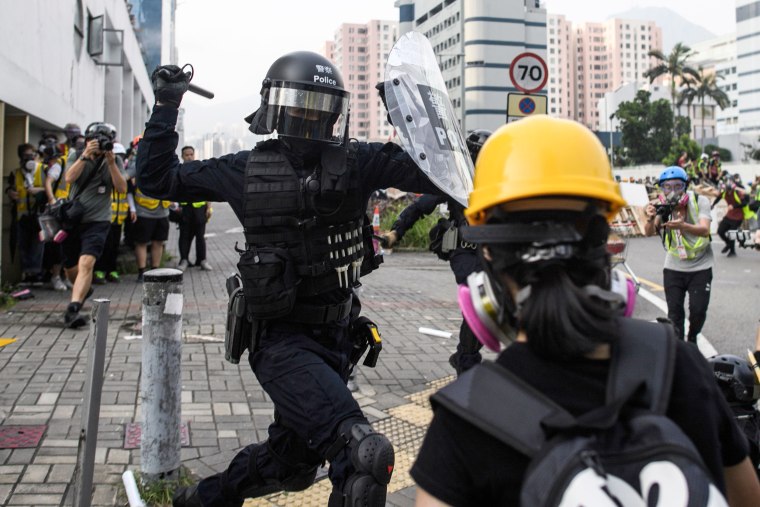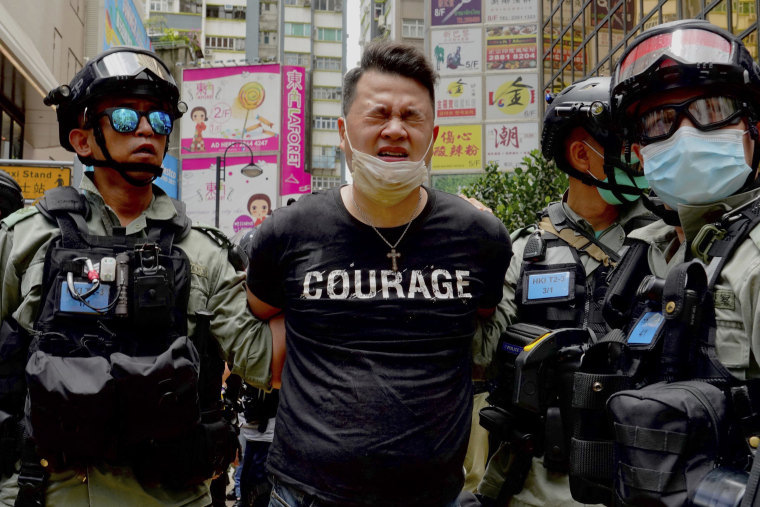A history under China’s rule after the 1997 handover
A 2014 determination by the central Chinese federal government to preselect candidates for Hong Kong’s prime task dashed hopes that the town would obtain the promised aim of authentic common suffrage.
The shift coincided with a civic disobedience motion coordinated by a few pro-democracy advocates, including legislation professor Benny Tai. The Occupy Central with Love and Peace movement aimed to paralyze the city’s most important money district to power the federal government to let fully no cost elections.
Police efforts to crystal clear the roads with tear gas prompted early protesters to defend them selves with umbrellas, supplying the movement its other identify: Umbrella Revolution.
The sit-in, which started in September and introduced activists like Joshua Wong to intercontinental attention, distribute outward from the city’s governing administration places of work, at some point blocking crucial streets in 3 major districts and polarizing general public feeling towards the movement.
The protest camps had been cleared soon after 79 days, bringing the motion to an conclusion without Beijing granting any of its requires for broader democracy. But a new era of professional-democracy leaders experienced been inspired by the practical experience.
2016: Legislative disqualifications
Undeterred by the stalled 2014 movement, youthful professional-democracy advocates sought to adjust the process from within just by jogging for seats in the city’s legislature. Even though some candidates were being barred from operating around thoughts about their sights on Hong Kong independence, other individuals were elected.
At the commencing of the new legislative expression, some activists utilized the oath-swearing ceremony to stage protests from the central federal government, with activist Sixtus “Baggio” Leung keeping a flag that read “Hong Kong is not China” for the duration of his oath. The collection of protests resulted in six elected reps being disqualified from using office.
2019: Anti-extradition protests

In early 2019, following the murder of a Hong Kong lady by her Hong Kong boyfriend though on getaway in Taiwan, authorities proposed an extradition invoice allowing for fugitive criminals to be sent for trial in destinations with no extradition agreements with Hong Kong, including Taiwan and mainland China.
The bill uncovered Hong Kongers to mainland China’s opaque authorized technique, increasing fears it could be applied to concentrate on professional-democracy elements in the city and further more curb its freedoms. Protests in opposition to the monthly bill swelled all over the summertime as reports of police brutality against demonstrations and authorities’ original unwillingness to withdraw the invoice fueled further more protest demands.
The largest protest, organizers explained, drew as numerous as 2 million people today.
Although the extradition monthly bill was finally withdrawn, protests persisted into January 2020, when Hong Kong confirmed its very first scenario of the coronavirus. Much more than 10,200 people today have been arrested in excess of the often-violent protests, which authorities sought to paint as a sequence of riots funded by international powers. About 2,850 have been prosecuted, with lots of imprisoned for a long time.
2020: Countrywide stability regulation

In response to the 2019 protests, Beijing imposed a nationwide protection law on Hong Kong, saying it was required to restore purchase. The law, promulgated on the eve of the handover anniversary, manufactured secession, subversion, terrorism and collusion with overseas powers punishable by lifestyle in jail. It also permitted for suspects to stand trial in mainland China. Overseas governments and legal rights activists have criticized the regulation as vaguely worded and draconian.
The regulation has considering that been utilised to concentrate on and shut down Hong Kong’s political opposition. Pretty much 200 people have been arrested underneath the law, which include 81 opposition leaders, 92 standard citizens with no prior community profiles, and 15 journalists, according to the Hong Kong Democracy Council, a nongovernmental organization dependent in Washington.
The overwhelming the greater part of the city’s pro-democracy figures are now guiding bars, have withdrawn from community lifetime or are dwelling in self-imposed exile.
Mass arrests and raids at the city’s pro-democracy newsrooms have spread worry across the town, main independent media outlets and scores of unions and other civil society teams to shut down.
Lee, Hong Kong’s new main government, has said a single of his best priorities is to enact the Short article 23 legislation that failed in 2003, increasing fears that the city’s freedoms will be additional eroded.








